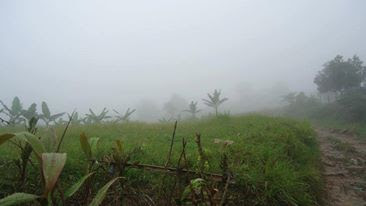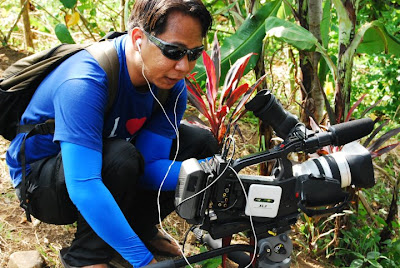As the saying goes “Once you pop, you can’t stop” I believe this also operates in the realm of filmmaking, especially when you’re passionate of telling stories in this medium. It is still clear in my head how I made my first film, “
Mananabang”
It was supposedly a short film but the itch of making it a feature-length movie kept ringing in my head, so I said why not. I had very limited funds available that time, all I’m banking was the script I wrote that I pitched to Dax Cañedo to help me produce the film.
By the time Dax gave me his green light I was really excited to do the shoot, problem is I still don’t have any cast and crew. I asked friends to help me realize the film. I printed a few scripts and give it to my prospect actors, I told them the story and asked If they can render their services for free.
It was really embarrassing and awkward on my part to ask them that, thinking how can I make something without the necessary dough at hand. Fortunately, they all agreed; they liked the story and wanted to be part of the vision.
I asked my high school friend if he can help me find a location, a rural looking location but if possible close to the city. He asked me to come to his house and check the village near them. I loved the place and decided to do the major scenes there. The other location was just near my house, it also have that kind of ambiance so we shoot several scenes there.
Instead of getting a crew I decided to do everything, from Directing, Cinematography, Production design even do the Sound and even Edited it during the post. It was like an “
Ako Tanan Production” (All-by-Myself production) I just wanted to prove or make a statement for myself that time. A feature length film done by just one person, what a bragging right.
 |
Mananabang's working title was "Hilot" it tells the plight of the midwife
amidst the government clamp-down on unlicensed birth attendants |
Thinking back, I felt stupid, cause even though it’s possible to have a one-man army in making a film there will be some important aspect in filmmaking that will be set aside and will be done poorly if you do it all by yourself.
Food and transportation were the focus of the budget that time,we schedule the shooting dates on weekends so that all of the cast and crew are free.
The biggest thing I learned doing the film was that “a film is a collaborative art.”
It is a combination of different forms of art weaved to tell a story. A filmmaker should understand that he is not Rambo or Braddock who goes to war alone. A cast and crew are absolutely needed to help you achieve your vision. And because they help you realize a dream, love and respect should always come with it whether you pay them or they give their services for free.
After more than a year, I had the opportunity to make another film, this time, with a film grant from FDCP. I hired my filmmaker friends to be my crew, all the best in town. Joan Mae Soco-Bantayan, our supervising producer (
my commander-in-chief ) handled all the professional fees for the actors and the crew. Everyone agreed to work on the budget presented to them.
During the pre-production phase, we arranged to get insurance for the entire team. That was the first time a production in Davao City provided insurance for the entire cast & crew which has encouraged other productions that follow.
We also asked the local government for assistance, before the shooting started the police were already aware of our activity in Sitio Kausayan, Brgy Guiangga. During the location scout, most of the key crew were there with us. We asked permission from the tribal chieftain since we are shooting in an ancestral domain area.
 |
| Tambara's shooting location in the highlands of Calinan |
The Bagobo-Clata led by their chief Danny Diarog accepted us with utmost hospitality; they even arranged for our accommodation, assigning houses where we can stay and even lent us their preschool building where all the male crew and some actors stayed for the entire duration of the shoot.
We were able to use the facility late in the afternoon and vacate the premises very early in the morning so that children can use the school. We were able to get additional personnel from the locals. The entire extra were from the community.
The site is very remote, reason why they asked us to convert their fees from cash to kind. We packed rice, noodles, and sardines for everyone who participated during the chapel scene. Even though we were given a grant for the film, still not enough to cover all the expenses incurred.
We went looking for additional funds, and even though it hurts to say, we even borrowed from loan sharks just to fill in the gap. On the day of the last shoot, all cast and crew were paid.
Everyone was happy during those times; it was definitely one hell of a fun shoot. All the laughter and fun, the camaraderie and respect for each other, definitely one of the best productions I can say. Every time we come to talk about it, smiles and laughter never shy away from us.
 |
| Tambara's film crew |
We were not able to file contracts with actors and crew. I am very grateful that they trusted me on my venture. Most of us say that our verbal contract was already enough to seal our dealings but that’s a lesson I learn; everything should all be in black and white. I know next time I’m doing another feature I will definitely push for signed consents and contracts, this is beneficial for everyone.
During the post production phase, we were already bleeding financially; I asked my editor, sound editor and musical scorer if it’s okay with them if I pay in installments. Thankfully they agreed.
Until now I still owe some of them, and I am not proud of it, if only I could I will never delay them their pay. I am even ashamed whenever we see each other knowing I still haven’t rendered them their dues.
I talked to them and apologized about my shortcomings, grateful that they understand the situation. Tambara will be screened in schools starting September up to February of next year. We have clinched a partnership with Davao Association on Catholic Schools to showcase the film.
By the time revenues come in, I will definitely put them on top of the list of things that we will settle plus additional rate for the time it took us to payback.
Filmmaking is not at all simple, I saw a lot of friendships soured because of this. A lot of disillusioned people, who walked away after trying and failed, a lot of relationships broken and frustrations along the way. It is not a walk in the park. You get people for their talents, skills and time. You pay them because of these, not many have the set of skills they have.
They have worked their asses off to earn their invisible badges of creativity, precision, competence and artistry. They definitely did not gain this overnight. These are the people who will back you up whatever happens in a production, who will never leave you in the air and will help you make your vision into a tangible reality. Filmmakers are required to render love and respect to all of them.
contributor:
A Dabawenyo filmmaker, Orvil Bantayan made his first full-length film Mananabang (Midwife) in 2010 and in 2012 he made his second feature-length "Tambara" which was a finalist in the first National Film Festival conducted by the FDCP (Film Development Council of the Philippines). Tambara was also shown in the 8th Mindanao Film Festival.














